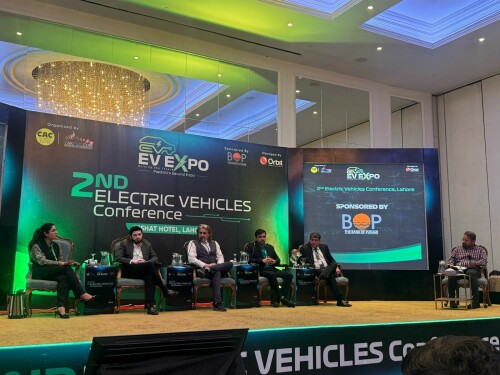2nd Electric Vehicles Conference Highlights Sector’s Potential in Lahore
LAHORE: The 2nd Electric Vehicles (EV) conference convened in Lahore on Saturday, gathering industry experts, policymakers, financiers, and environmental advocates to boost discussions on Pakistan’s EV sector, spotlighting its opportunities and challenges.
Organized by the Climate Action Centre (CAC) and PakEVO, with sponsorship from Bank of Punjab, the conference represented a key stride in coordinating public and private endeavors to promote EV adoption and domestic manufacturing in the nation.
Umer Khan, Head of Investment Banking, FI & Corporate Banking Central at Bank of Punjab, voiced his optimism regarding the future of EVs and related infrastructure in Pakistan during his keynote speech.
He stated, “In line with global trends, significant advancement in EV adoption and conversion will require substantial government support through subsidies and tax incentives.”
He further noted that “considerable financial resources and credit enhancements are available for climate finance and EV ventures, which can be accessed by presenting compelling proposals to international Development Finance Institutions (DFIs).”
Dr. Aazir Khan introduced PakKEVO, a newly launched initiative focused on advancing EV education, collaboration, and policy improvements. He emphasized the missed opportunities in previous years due to Pakistan’s economic constraints, which hindered budget allocations for crucial EV projects.
Dr. Aazir stressed, “We must ensure that fiscal priorities align with sustainable energy objectives, especially given that climate resilience and green infrastructure are now indispensable.”
Discussions revealed that despite a nearly 40% surge in global EV sales between 2023 and 2024, Pakistan’s market penetration remains notably low. However, a sense of cautious optimism prevailed due to encouraging developments, including Daewoo’s ambitious plan to replace diesel buses with EVs on shorter intercity routes, such as those near Lahore like Sialkot.
Sheriar Hassan from Daewoo mentioned during the first panel, “Our aim is to convert our entire short-route fleet to electric within the next two years,” adding that financing partnerships with BOP are already in progress.
Distribution companies (DISCOs) are also grappling with substantial capacity and load management challenges, which currently render long-route EV bus operations impractical. Sheriar pointed out that while Daewoo successfully launched its initial electric bus pilot project between Lahore and Sialkot, expanding to larger intercity routes like Islamabad and Lahore will necessitate considerable time and substantial investments.
Panelists highlighted Pakistan’s strong potential to become a regional EV manufacturing center. Localization emerged as a key focus, with Nauman Alvi of EVEE Motors noting that the surge in two-wheeler sales—1.4 million units in 2024—was largely driven by the local production of affordable 70cc and 125cc models.
He urged similar localization efforts for EV components, starting with plastic parts that constitute 15-20% of vehicle costs, emphasizing that widespread EV adoption hinges on achieving economies of scale.
Noman Alvi shared insights from his company’s experience, noting that 20% of EV users in Pakistan are women, compared to less than 1% in traditional automotive markets, indicating that female education and awareness campaigns are crucial for promoting adoption.
Saleha Hassan, a key official from DFML, challenged the notion that EVs are merely luxury items, stating, “It’s a utility decision—you invest in EVs because you invest in lifestyle change.”
She added that hatchbacks account for 52% of the EV market, demonstrating significant consumer preference. Saleha’s company, DFML, produces the hatchback EV Honri. She also advocated for discouraging Completely Built-Up (CBU) units while supporting Completely Knocked Down (CKD) assembly.
Despite these positive indicators, significant obstacles remain. Pakistan’s charging infrastructure is still underdeveloped, restricting EVs mainly to short-distance, urban commutes.
Financing hurdles add further complexity. Globally, high battery costs (representing 30-40% of EV expenses) and uncertainties regarding resale values deter potential buyers. In Pakistan, this is exacerbated by economic instability, high interest rates, and limited consumer financing options. However, successful initiatives like the CM Punjab’s Interest-Free Bike Scheme offer models for broader EV financing programs.
The conference also explored innovative financing mechanisms such as green bonds, battery leasing, and partnerships between the public and private sectors. Panelists referenced global examples like the US Inflation Reduction Act and Europe’s zero-interest loans to illustrate how strategic financing can stimulate EV ecosystems.
Speakers collectively agreed that robust policy support and collaboration among the government, financiers, and manufacturers are crucial. Yasir Husain, Director at CAC and the conference’s chief organizer, stated, “Climate action needs to move from buzzwords to boardrooms, from discussions to actions—and EVs offer a bridge between economic strength and environmental responsibility.”
Throughout the sessions, representatives from the manufacturing and financial sectors emphasized that local assembly initiatives could establish the nation as a strategic export hub. The localization of battery production is also anticipated to commence soon, paving the way for a more sustainable supply chain.
Zulfiqar Younas from the Ministry of Climate Change and Dr. Umer Masud, Secretary of the Ministry of Industries and Production (MoIP), also addressed the audience.
The conference concluded with participants stressing the necessity for immediate, coordinated action to capitalize on the sector’s potential. With the global EV market expanding and Pakistan’s youth-driven demographics presenting a receptive consumer base, stakeholders concurred that the era of fragmented efforts is over—a national EV ecosystem is not just an environmental objective but also an economic imperative.



Comments (0)
No comments yet. Be the first to comment!
Leave a Comment